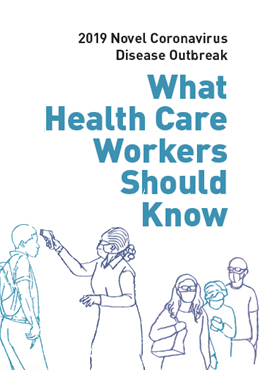What should my health care facility be doing to protect people against 2019-nCoV infections?
- Post signs reminding people to tell a health care provider if they have fever, cough, difficulty breathing, or a history of contact with someone who has these symptoms.
- Screen people entering the facility at all points of entry to identify persons who could have 2019-nCoV infection.
- Isolate all persons suspected of having 2019-nCoV infection.
- Use standard precautions for all patients.
- Use standard, droplet, and contact precautions for all persons suspected of having 2019-
- nCoV infection.
- Follow the World Health Organization (WHO) guidelines for administrative and engineering controls.
How do I know if a patient possibly has 2019-nCoV?
All health care workers should maintain a high level of clinical suspicion, including asking all patients about fever, cough, difficulty breathing, history of travel, and history of contact with ill persons. Sample screening questionnaires are available at: https://www.who.int/publications-detail/globalsurveillance-for-human-infection-withnovelcoronavirus-2019-ncov.
Offer a medical mask to anyone you suspect has 2019-nCoV.
I suspect my patient has 2019-nCoV infection. How do I protect myself?
- Wear a medical mask. A medical mask is a flat, pleated, or cup-shaped material that covers the face and nose and uses straps that wrap around the back of the head to stay in place.
- Wear goggles or a face shield to protect your eyes from contamination with secretions and droplets.
- Wear a clean, long-sleeved gown.
- Use disposable latex gloves.
- Do not touch your eyes, nose, or mouth with your gloved or bare hands.
- Dispose of the mask, goggles, face shield, gown, and gloves after you have used them. Do not re-use them on the same or a different patient.
- Report suspected 2019-nCoV cases immediately to the local health authority, which should report cases to the national authority.
Why do you recommend a simple (medical) face mask and not a respirator?
There are many different devices to cover your face and mouth while caring for a patient. The most common is known as a ‘medical’ (or ‘simple’) mask. If worn properly, it can help protect against 2019-nCoV infection. Medical masks are designed to be used only ONCE.
If I perform tracheal intubation, bronchoscopy, or other airway procedures on patients, how do I protect myself?
Procedures involving the patient’s airway can result in viral particles traveling further through the air. They are known as ‘aerosol-generating’ procedures and include: tracheal intubation, bronchoscopy, non-invasive ventilation, tracheotomy, cardiopulmonary resuscitation, and manual ventilation.
For these procedures, you should:
- Only perform the procedure in an adequately ventilated room.
- Use a ‘particulate respirator,’ such as an N95 (United States standard) or FFP2 (European Union standard).
- Use goggles or a face shield.
- Wear a clean, long-sleeved gown and gloves.
- Use a waterproof apron if procedure will generate large volumes of fluid.
I have a fever, should I go to work?
Health care workers with illness should stay home to avoid transmitting infection to patients or colleagues. If you have a mild illness, you should stay home until you are completely free of symptoms. You should seek out medical care if you develop more severe symptoms or your illness does not resolve.
How do I protect myself against being infected with 2019-nCoV?
All health care workers should use ‘standard precautions’. This includes proper hand hygiene, respiratory hygiene, use of personal protective equipment (PPE), and injection safety practices.
What is proper respiratory hygiene?
- Ensure that all patients cover their nose and mouth with their arm/elbow or tissue paper when coughing or sneezing.
- Offer a medical mask to any patient you suspect has 2019-nCoV infection.
- Perform hand hygiene after any contact with respiratory secretions.

